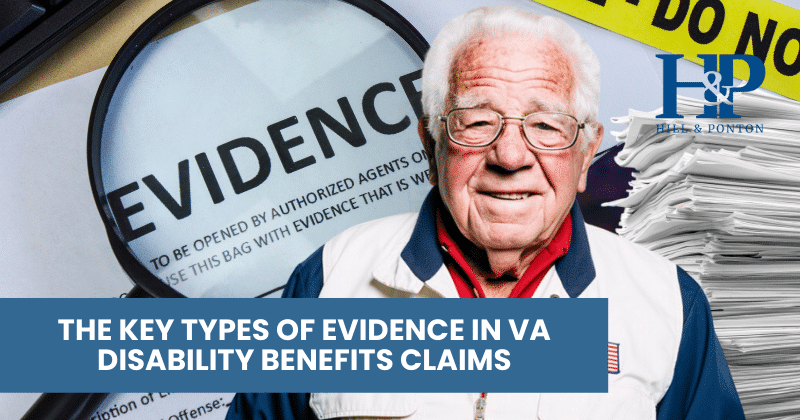Migraines are more than just headaches; they’re a heavy burden that many veterans know all too well.
If you’ve served and have been diagnosed with migraines, you might be wondering about your VA rating and if there’s any way to increase it.
The answer is a resounding yes, especially when considering migraine secondary conditions.
While you can only earn a maximum of 50% rating for migraine headaches, remember: there are ways to increase your rating that you should always consider, because migraines don’t always come alone!
As these conditions stack up, they can have a significant impact on your daily life, possibly increasing your disability rating.
Migraine secondary conditions can range from mental health struggles like PTSD, anxiety, and depression to physical ailments that result from or are made worse by migraines.
Recognizing these conditions and linking them to your primary migraine diagnosis can be the key to unlocking higher VA benefits.
If you’re just getting started on understanding migraines and their VA ratings, check out our comprehensive guide that breaks down the basics.

But if you’re ready to dive deeper into the world of secondary conditions and how they might enhance your VA rating, you’re in the right place.
This guide will help you navigate the maze of secondary conditions, provide steps to apply effectively, and offer solutions if you hit any roadblocks.
Let’s get started!
Secondary Conditions Linked to Migraines
The shadow of migraines often stretches beyond the pounding pain and the dizzy spells.
For many veterans, migraines don’t come alone; they bring along a series of secondary conditions that can be equally, if not more, disruptive.
Understanding these conditions isn’t just essential for better health management; it’s crucial if you’re wanting to bump up that VA rating.
The Intricate Relationship Between Migraines and Mental Health
Migraines are more than physical pain.
The constant battles against these crippling headaches often lead to mental strains.
Let’s explore:
- PTSD: It’s no secret that many veterans wrestle with Post-Traumatic Stress Disorder. What’s less known is how migraines can deepen this struggle. The stress of coping with regular migraines can trigger PTSD symptoms, and vice versa.
- Depression: Constant pain, blurred vision, sensitivity to light and sound—migraines can make everyday life feel overwhelming, leading to feelings of sadness or hopelessness, hallmarks of depression.
- Anxiety: The unpredictability of migraines can breed anxiety. The constant fear of when the next attack will strike can amplify stress levels, pushing some into the anxious territory.
Research and studies have thrown light on these links, suggesting a bi-directional relationship. This means not only can migraines lead to these mental health issues, but conditions like PTSD can also increase the frequency or severity of migraines!
In-Service Injuries and Their Aftermath
Migraines aren’t born in a vacuum.
Many times, they’re the result of injuries or experiences during service.
While our main guide dives deep into this, let’s touch upon some primary triggers:
- Traumatic Brain Injuries (TBI): A blow to the head, an explosive blast—TBIs can be the genesis of chronic migraines.
- Chemical Exposures: Encounters with harmful chemicals, like burn pits or chemical solvents, can be silent migraine inducers for many veterans.
- Physical Injuries: Injuries to the eye, neck, or back, even if they seem minor, can become the root of recurring migraines down the road.
However, the aftermath doesn’t stop at migraines.
These headaches can usher in secondary complications:
- Sleep Disorders: The relentless pain can steal peaceful nights, leading to disorders like sleep apnea.
- Chronic Mental Health Issues: The continuous battle against migraines can escalate mental health challenges, pulling conditions like depression and PTSD into the mix (as mentioned above).
Recognizing and documenting these connections is crucial.
Not only for better health management but also for presenting a robust case for a more comprehensive VA rating.
Remember, migraines are not just a personal health battle; they’re a testament to your service and the sacrifices you’ve made.
Steps to Apply for Secondary Conditions Related to Migraines
Migraines aren’t just an isolated health challenge; they’re the center of a web of related conditions that can touch multiple facets of a veteran’s life. If you’re desiring to increase your VA rating, recognizing and effectively claiming these secondary conditions is pivotal.
But where to start?
Let’s break down the steps:
1. Medical Documentation: Foundation of Your Claim
Before you dive into the application process, gather all pertinent medical documentation.
This includes:
- Proof of Diagnosis: Whether it’s PTSD, anxiety, depression, or any other secondary condition, having clear medical records is paramount.
- Evidence of Connection: Highlight any medical notes or observations suggesting a link between your migraines and the secondary condition. This could be a note from a psychologist about the impact of migraines on your mental health or documentation showing the sequence of when the symptoms began.
- Migraine Journal: While not a strict requirement, maintaining a migraine journal can lend weight to your claim. Jot down the frequency, triggers, and severity of your migraines, and any patterns that correlate with your secondary conditions.
If you want the most comprehensive guide about gathering evidence for your claim, we have you covered.

2. Nexus Letter: Bridge the Gap
A nexus letter acts as a bridge, linking your in-service injury or experience to the current medical condition.
Consult a medical professional who understands your history and the relationship between migraines and secondary conditions to draft this.
This letter should:
- Clearly state that the professional believes your secondary condition is “at least as likely as not” connected to your migraines.
- Provide a rationale, drawing from your medical history, research, or their expertise, to support the claim.
For an in-depth look at nexus letters and how to get a compelling one that will win your case, check out our post below.

3. Application via VA Form 21-526EZ
You’ll apply using the VA Form 21-526EZ.
When filling out:
- Be thorough. Ensure that all sections related to secondary conditions are correctly filled.
- Attach all the evidence gathered in Step 1 and the nexus letter from Step 2.
- For digital submissions, ensure that all documents are clearly scanned, legible, and organized.
We have everything you need to know about this important VA Form in our guide below!

4. Stay Proactive: Attend All C&P Examinations
After submitting your application, the VA might schedule you for Compensation & Pension (C&P) exams.
These are crucial:
- Attend all scheduled exams. Missing even one can negatively impact your claim.
- Be open and honest. Describe your symptoms and their effect on your daily life without exaggeration but also without minimizing them.
The team at Hill & Ponton is well versed about C&P Exams.
There’s a ton of information on our site to help you through every step of the process. Including the guide below!

5. Consider Expert Help for Denied Claims
Even with a solid case, there’s a chance your claim could be denied.
If that happens:
- Don’t be discouraged. Many veterans successfully appeal denied claims.
- Seek expert help. A seasoned veterans law firm, like Hill & Ponton, can guide you through the appeal process, optimizing your chances of a successful outcome.
Migraines and their secondary conditions can be a complex maze to navigate.
But with meticulous documentation, the right strategy, and persistence, the path to a higher VA rating becomes clearer.
For many veterans, the journey with migraines extends far beyond the physical pain.
It intricately weaves into emotional and mental aspects of their lives, touching and often exacerbating other conditions.
Recognizing the profound impact of migraines and their secondary conditions is essential.
More than just comprehension, it’s about taking action.
By strategically approaching the VA claims process, you can secure the benefits you rightly deserve.
When Claims Get Denied: Seeking Expert Help
It’s an unfortunate truth that sometimes, despite the best efforts, VA claims get denied.
But this isn’t the end of the road; it’s merely a bend.
The experts at Hill & Ponton understand the nuances of VA disability claims, especially when it comes to migraines and their secondary conditions.
Why should you consider reaching out to Hill & Ponton?
- Experience: With decades in the field, we’ve assisted countless veterans in navigating the intricacies of VA claims and appeals.
- Personalized Guidance: Each veteran’s journey is unique, and we approach every case with the tailored attention it merits.
- Advocacy: We’re not just here to provide legal advice; we stand by your side, championing your right to the benefits you deserve.
If your claim gets denied, don’t hesitate.
Put experience and expertise to work for you.
You can reach us at 1-888-477-2363 for a comprehensive discussion on the next steps.
For those looking to initiate the process swiftly, we’ve got you covered.
Start a free case evaluation with just a click.





